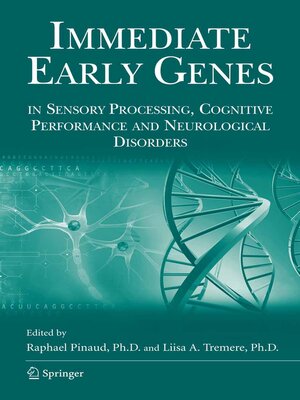Immediate Early Genes in Sensory Processing, Cognitive Performance and Neurological Disorders
ebook
By Raphael Pinaud

Sign up to save your library
With an OverDrive account, you can save your favorite libraries for at-a-glance information about availability. Find out more about OverDrive accounts.
Find this title in Libby, the library reading app by OverDrive.



Search for a digital library with this title
Title found at these libraries:
| Library Name | Distance |
|---|---|
| Loading... |
Immediate early genes (IEGs) are a class of genes that are rapidly expressed without new protein synthesis and, in most cases, in direct response to synaptic input. The most widely studied IEGs in neurobiology encode transcription factors, with two popular examples being c-fos and NGFI-A (a.k.a., zif268 , egr-1, krox-24 and zenk). The activity-dependent expression of most inducible transcription factors has enabled neuroscientists to use their expression as mapping tools for neuronal activation, thereby enhancing our understanding of the anatomical and functional organization of the central nervous system (CNS). IEGs, however, are known to encode not only transcription factors, but a much wider variety of proteins including signaling molecules, growth factors and cytoskeletal proteins. IEGs are therefore both directly and indirectly implicated in the dynamic functional and anatomical restructuring of the CNS that permits the rapid integration of new sensory experience with pre-existing or on-going neural function. Finally, recent evidence suggests that IEGs may also be implicated in the initiation or amplification of aberrant signaling in connection with neuropathological disorders.
This book reviews and details experiments and theories that challenge the reader to expand their view on how IEG research is currently being used to advance our understanding of static and active brain circuits, enabling the processing, acquisition and storage of new information in healthy systems. In addition, we explore roles of IEGs in clinical neuropathology, with potential utility in molecular modeling, to highlight, on a go-forward basis, candidate mechanisms for novel targets in clinical intervention.







